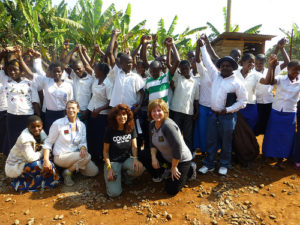I cannot believe that in a few days, I will be leaving on my fourth trip to Congo. I always have mixed feelings at this point — excitement about going back to a country I have truly begun to love on many levels, and yet some anxiety about being so far from home in a place not totally stable. This year, I may have a slight bit more anxiety as only a few weeks ago I was rushed to the hospital for an emergency appendectomy. All I could think about was thank god I was not in Congo when this happened for, as amazing as our medical partners are there, there is much still that is needed to bring medicine up to western standards.
And yet this time, I find myself reflecting on the huge changes I have seen since 2009 when we took our first trip. Before we left for that first trip, I wrote, “I am facing this trip with a myriad of conflicting emotions. I feel humbled at the thought of listening and learning from women who have experienced things so unthinkable and inhumane and have survived… I go with feelings of trepidation. I am bracing myself for stories and images that are more ugly and hateful than I can imagine. And I have to admit I am a little scared.”
Today, I have such different feelings about Congo. I believe that there is so much hope for this country and for those same women and their children and even for the young men who were taken as children to be soldiers in the armed groups, and who have perpetrated many of those inhumane acts. Thanks to advocacy on the part of organizations like Jewish World Watch and individuals who have spoken up and demanded accountability on the part of Rwanda, the M23 rebels have dispersed. And thanks to advocacy, there are now companies like Intel that are demanding that the mines from which they derive the minerals needed for their products are conflict-free.
I also say, with great pride, that thanks to the work of our amazing local and international partners, the conversation in Congo has shifted from talking only about helping the survivors to discussions about changing the very culture of Congo — looking at the systemic culture of gender equity. These are issues that can truly impact the future of Congo, and we are supporting programs that are working to affect these cultural changes.
On this trip, we will be looking at a huge, public-private sustainability project in the Virunga National Park, the Virunga Alliance. It is a project that can be a model for the rest of the DRC. Through the Virunga Alliance, the park authority is building clean, sustainable hydro-electric power plants while also creating 60,000 jobs, securing the park’s long-term sustainability for tourism, building 55 schools, 22 health clinics, repairing 300 kilometers of road and providing access to clean water for 110,000 people. I am so excited to visit this project because it represents a shift out of conflict and into rebuilding a Congo that can highlight the beauty and hope that DRC holds.
There is a long way to go in the DRC. The situation is still very tenuous — new rebel groups appear and old ones reappear. Infrastructure is mostly absent and the government does not seem too inclined to do much about it; however, with the focus that the world has begun to put on the DRC in the last 5 years and with the work of organizations like Jewish World Watch and our amazing Congolese partners, a shift has clearly occurred. This time I leave not with trepidation but with anticipation — anticipation of being inspired and returning even more committed to helping Congo and its people achieve the sustainability they deserve.


